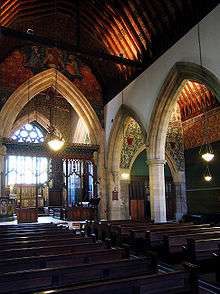All Saints' Church, Cambridge
| All Saints', Jesus Lane | |
|---|---|
|
View of the 175 feet (53 m) spire | |
 Location in central Cambridge | |
| General information | |
| Architectural style | Gothic Revival |
| Location | Jesus Lane |
| Town or city | Cambridge, England |
| Country | United Kingdom |
| Coordinates | 52°12′30″N 0°07′24″E / 52.208277°N 0.123231°E |
| Construction started | 1863 |
| Completed | 1870 |
| Design and construction | |
| Architect | G F Bodley |
All Saints' is a church on Jesus Lane in central Cambridge, England, which was built by the architect G F Bodley. The church was constructed between 1863 and 1870 and, as a notable example of the Gothic Revival style and the Arts and Crafts Movement, is a Grade I listed building.[1] It is no longer a parish church, but has been under the care of The Churches Conservation Trust since 1981.
History
A mediæval church, All Saints in the Jewry, stood in St John's Street, Cambridge. Its history dates back to the 11th century and by the 13th century was in the patronage of St Radegund's Nunnery, later re-established as Jesus College. The church was rebuilt several times but by the nineteenth century was deemed too small for the growing congregation. It was finally demolished in 1865 to be replaced by a new building in Jesus Lane. The churchyard of the original church is now an open space known as All Saints' Garden and contains a memorial cross designed by Basil Champneys in 1882.[2][3]
Although it was initially hoped that George Gilbert Scott would design the new church. George Frederick Bodley who had been Scott's talented pupil, was chosen. The foundation stone was laid on 27 May 1863 and was consecrated on 30 November 1864. Between 1869 and 1871 the present tower and spire were added, with the church of Ashbourne, Derbyshire, used as the model.[2]
The church fell out of use as a place of worship in 1973 and lay redundant for several years. A plan to demolish part of the building was abandoned in 1981.[4] Today the church is used by the neighbouring theological college, Westcott House, for worship and for secular events, such as art exhibitions. It is open to the public daily.[5]
Architecture
The church's spire is a prominent Cambridge landmark. At around 175 feet (53 m) in height it was, at its construction, the tallest building in the city; it remains the city's third tallest building, after the chimney of Addenbrooke's Hospital and Our Lady and the English Martyrs Church.[2]
The church is noted for its strikingly decorated interior, much of it designed by Bodley. Fittings designed by Bodley include the alabaster font, the pulpit, and the oak aisle screen.
The painted wall and ceiling decorations, by the Leach Studio, Morris & Co. and others, are covered in stencilled patterns and repeated use of religious symbolism such as the Sacred Monogram and the Fleur-de-lis. Around the upper walls are texts from the Book of Revelation (Revelation 7:9) and from the Beatitudes (Matthew 5:3-12). Part of the Beatitudes have been lost due to water damage to the plaster.[2]
The stained-glass east window was designed by Edward Burne-Jones and executed by Morris & Co. The twenty figures were individually designed by Burne-Jones, Ford Madox Brown and William Morris. In the north aisle are three windows by C E Kempe and Douglas Strachan.[2]


See also
- Gothic Revival architecture
- British and Irish stained glass (1811–1918)
- Arts and Crafts Movement
- Anglo-Catholicism
- List of churches preserved by the Churches Conservation Trust in the East of England
References
- ↑ Historic England. "All Saints Church (Grade I) (1126204)". National Heritage List for England. Retrieved 19 January 2015.
- 1 2 3 4 5 "All Saints' Church, Cambridge, Cambridgeshire". Churches Conservation Trust. Retrieved 25 March 2011.
- ↑ Ian Kitching. "Religious & Hospital Foundations". Cambridge — Past, Present and Future. Retrieved 2008-05-31.
- ↑ Cambridge Association of Architects. "Rebranding Cambridge" (PDF). Cambridge Architecture Gazette. Retrieved 2008-05-31.
- ↑ "All Saints". Westcott House website. Retrieved 2008-05-31.
External links
| Wikimedia Commons has media related to All Saints, Cambridge. |
- All Saints' - Churches Conservation Trust website
- All Saints - Westcott House website
